Fiction
Nonfiction
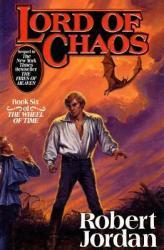
While the first five novels in the Wheel of Time series were near masterpieces in their own right, the sixth entry is where the series begins to peter out a bit. Whereas the previous novels were compelling high fantasy adventures, this one seems to exist in more of the vein of a drama. Intense magical battles and high stakes plots to unravel are here replaced with the female characters prattling on about the color and feel of their dresses, or complaining about men with each other. Additionally, there is an enormous cast of characters to keep track of, which does tend to drag the novel down and make it more confusing than it needs to be. True, this was also a problem in the the first five novels, but compounded with the sometimes boring plot and mundane female characters it becomes a much more noticeable problem. Most of the novel is people sitting around postulating for power and talking. However, there are some things to be appreciative of, such as the political intrigue, chapters from the Forsaken point of view, and the return to Shadar Logoth, but these things just don't help the novel in the long run. I would recommend it to anyone who has read the previous five books.
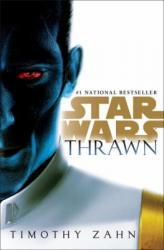
This book was amazing. It is a must-read for Si-Fi and Star Wars fans.
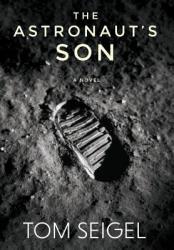
***THIS BOOK WAS RECEIVED FROM A GOODREADS GIVEAWAY***
While the modern landscape for space exploration is expanding in ways that are very exciting, it’s interesting to read a story set in the early 2000’s that actually accomplishes something that hasn’t happened in decades: landing on the moon. And yet, this part of the plot of The Astronaut’s Son takes a minor role when compared with the primary thrust of the story. Sure, I would have thought that there would be plenty of things to occupy an astronaut’s time in the lead-up to a significant accomplishment, but apparently, there’s plenty of free time to explore the validity of a conspiracy theory.
I’ll admit that I never thought that there would be Nazi sympathizers in the space program, but The Astronaut’s Son brings up a few interesting and perhaps semi-plausible ideas. These are explored via the main character’s investigation as to whether his father’s sudden death would was truly due to a health condition that could affect him during his own mission, or if it was due to more sinister circumstances. Despite not ever seeming to deliver straight answers, the journey was still exciting and entertaining. The story may be fictional, but there did seem to be some deep-seated elements that had the possibility of being true, thus helping to suspend my disbelief.
Some of the other subplots, like the birth of a child and numerous characters’ marital infidelities, were interesting for character development, even if I thought they would have affected the main plot more than they did. After all, wouldn’t it be more interesting if there wasn’t even a genetic link between the main character and his father after all? At any rate, I was certainly blown away by this book at first, and it wowed me with its writing and style. However, if you think too much about it, you’ll start to realize there are some holes in it that can’t entirely be covered up, regardless of its entertainment value.
An interesting and perhaps plausible exploration of Germans and Jews in the space program, I give The Astronaut’s Son 4.0 stars out of 5.
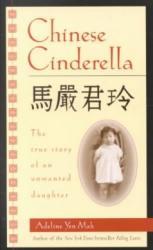
The true story "Chinese Cinderella" is about a young Chinese girl named Adeline who faces the struggles of being unwanted and unloved. Adeline is seen as bad luck because her mother died after she was born. Her stepmother, Niang, hates her and favors all other siblings besides Adeline. Adeline achieves academic awards and good grades in hopes to make her family proud however they still see her as nothing. Throughout the book she faces many different problems all relating to her family mistreating her. Adeline is even sent to an orphanage at one point due to her friends coming to her house to throw a party for her. Not only does she face physical issues, but Adeline faces mental and emotional issues. Despite these issues, Adeline stays strong until the end and continues to try her best.
I read this book for a book report and was not at all disappointed."Chinese Cinderella" was sad but heartwarming. During multiple points in the book I cried. Adeline's feelings are very relatable and real. I thoroughly enjoyed the book."Chinese Cinderella" is in a genre of books I do not generally read however I was surprised and actually liked it. It is one of the best books I have read this year; I would definitely recommend it.
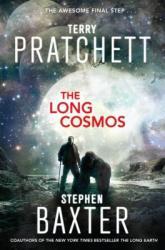
By the time I reached the end of the Long Earth series, I had a revelation. With the bounding conditions of the universe being that there are multiple worlds accessible via stepping and that no iron can pass between worlds, the ideas to explore these multiple worlds are almost endless. My revelation was that this series would have been better as an anthology of short stories from a collection of authors, instead of a handful of semi-disjointed novels that didn’t ever quite know what they were doing. The story never shined through, instead of feeling like a distracted three-year-old who wants to explore the potential of other worlds.
While I felt the series was starting to succeed in telling coherent and solid plots, this book removed that forward progress. When nearly one-third of the first part of the book seems to be comprised entirely of summary and recaps of the last four books, you know there’s not a lot of original ideas present in this one. And while minor tangents like the Johnny Shakespeare side-plot were amusing, they were loosely connected to the main plot at best. Even this main plot didn’t feel like it had enough time spent on it, as the main character of Joshua Valienté seemed to spend most of his time distracted on other worlds with unique trees instead of exploring the Long Cosmos that this book was supposed to be describing.
Even though this book was released after Terry Pratchett's death, it was clear he still had some of his influence on the plot and characters. Unfortunately, as was the case in the other books of the series, his contributions seemed to be fairly obvious, as they were the ones that didn’t quite fit in with everything else and just managed to be silly in an otherwise scientific exploration of new worlds.
The final book in a series that should have been an anthology, I give The Long Cosmos 2.5 stars out of 5.

How to Raise the Perfect Dog is a great book for those looking to raise a dog. Whether your skeptical about getting a dog or have problems with your current one, this is the perfect book for you. While it's quite a weird book to review, the book gets across its point. It teaches the fundamentals of raising a dog and even elaborates very well on some aspects of dog raising. Overall, it's a pretty good book, but I would only recommend it to those who have a dog.
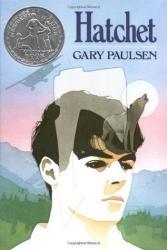
The award winning book by Gary Paulsen, Hatchet, is about a boy named Brian
whose parents are divorced. Right before, Brian gets on the plane that would
take him to his Dad’s house, his mother gives him a hatchet. While flying
over the 1000s of miles of forests in Canada, the pilot has a heart attack
and dies. Brian is forced to fly the plane into a lake in the middle of the
forest. Somehow he survives the crash, but now he is stranded in the
wilderness. He must survive against the harshness of nature with only his
mind and the hatchet to help him.
The realistic scenarios make the reader feel like they are trapped in the
forest with Brian. It was interesting to think about what would have happened
if he did not have the hatchet with him and the reader wonders what they
would do in Brian’s place. Would they be able to survive until help came
and make life or death decisions?
Hatchet is actually the original book in what Paulsen turned into a five book
series. I would recommend reading the whole series, it really deepens the
view of the story. My personal favorite is the second book, Brian’s Winter,
but the entire story is definitely worth reading. 8th Grade.
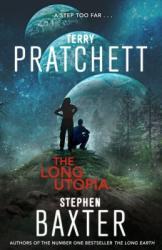
After the events that take place in The Long Mars , I was expecting the next book in the series, The Long Utopia, to be about the CEO of the Black Corporation and the settlement he established to help him live longer. Instead, I got a story that had little to no connection to the previous plots. That being said, at least there was a story with a projected conclusion instead of merely a series of random events that eventually led to the sudden destruction of some location (as had been the case up until now).
While I did appreciate some of the back-story for Joshua Valienté, there wasn’t anything in Joshua’s behavior or motivations in any of the previous books that indicated that he was even interested in learning about his past. I also was pleased that some of the “limitations” of this universe were brought back, or at least provided as a reminder to the reader. It honestly doesn’t make sense to me that these parallel worlds would have the kind of technology available to them without the use of iron. The fact that the material workarounds were never explained is probably the most frustrating part to me.
As I mentioned already, the stronger story in this book helped keep me invested in the characters, not only as they tried to figure out what was happening, but as they tried to determine how to stop it. Unfortunately, none of the consequences in this universe seem to hold any weight. Lobsang can “die,” but there are still plenty other versions of him around. The Next can be mostly exterminated, but then the next book just glosses over the attempted genocide. In the end, though, I can’t honestly tell you what the titular “Utopia” of this book was, and that’s disappointing.
A slightly above-average chapter in the Long Earth series, I give The Long Utopia 3.0 stars out of 5.
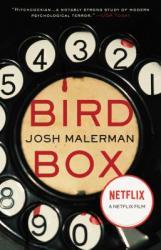
Imagine, you are a mom who has had to raise her two kids in a world where going outside was a major undertaking. No! This world is not filled with the usual “monstrous suspects” you come to expect in horror novels, vampires, werewolves etc.. this evil is unseen and unknown. It can’t be known, for you see, the moment any person glimpses it, this “evil” drives them to unspeakable violence and shortly after, their own death. The world didn’t used to be like this, it used to be normal but since “the evil” infested our world, things have never been the same. This evil leaves no survivors, and no one can stop it because no one can see it. It simply is unbeatable.
Malorie and her two children live in this world where evil can ravage anyone if you were just to step outside. To protect her and her children she raises them and teaches herself, to live life almost completely blind with a blindfold on most of the time. They do the best they can, holed up in their home trying to survive. One day through their meager means of communication Mallorie hears of this place 20 miles downriver where her and her family might be safe. But only if they can get there. Malorie and her kids, soon after, set out on a harrowing and terrifying journey downriver, all while wearing blindfolds, that will test them in ways they couldn’t have imagine.
Mallerman creates a horrifying and terrifying experience for readers that will leave them continually guessing. The strength of this story is also what makes it the best kind of horror. It’s unknowable and theirs a mystery around every corner. It could be something that could turn out to be a monster or something that could help the hero’s on their journey. The tense and creepy atmosphere Mallerman creates from the character’s surroundings also adds to the overall terrifying and mysterious aura of the story. Add to this that the evil so talked about throughout the book, is never actually revealed. Mallerman does a brilliant job of revealing some things but not everything leaving the readers imagination to make up the rest. And that is the strength of this book really, it turns the readers mind against them. Highly original and so creepy this book is a solid five stars. Pick up this intense terrifying psychological horror story today. And check out the movie coming to Netflix this December. I promise you, you won’t regret it!
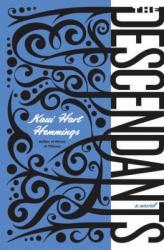
On paper, the plot of The Descendants almost sounds like a bad soap opera. A man who has the deciding vote that could mean wealth for him and his extended family is dealing with an unfaithful wife who is in a life-threatening coma. The execution of this plot, however, brings so much humanity to the forefront that I wouldn’t be surprised if any of these events were real. While I loved the movie adaptation of this book, the first-person narrative of the book helped add so much more depth to the story. It’s difficult to get into the main character’s head when there’s no internal monologue like in the movie.
Of course, with such realistic and vulnerable characters, there were bound to be a few that I didn’t like. Ironically enough, I hated the comatose wife. Sure, her husband was probably a bit of a workaholic, but he always meant well and was practically saint-like in his dealings with her, her family, and her friends after her accident. I think the most significant part of my dislike of the wife was how much she seemed to screw up her kids. Throughout almost the entire book, the main character is trying to control his out-of-control daughters, and it becomes abundantly clear where they got their tendency for poor life decisions.
In the end, I probably wouldn’t like the wife character if I met her in real life, which is why I didn’t like her in this book. That says a lot about the realism of the writing here. To be able to create a character that I reacted to on an emotional level (even if it was a negative emotion), with nothing more than what other characters said or remembered about her speaks volumes to the author’s talent. If anything, the contrast of the main character was heightened because of it and showed how noble and upstanding his actions were in the midst of crisis and significant life changes.
An expertly-written book full of juicy drama, I give The Descendants 4.5 stars out of 5.
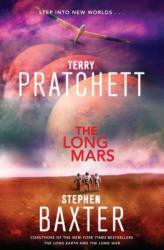
While the previous two entries in this series seemed to be disjointed in their writing styles, The Long Mars seemed to iron out some of these discrepancies . . . finally. In The Long Earth and The Long War , you could almost pinpoint the sections that Terry Pratchett wrote and the sections primarily written by Stephen Baxter. By The Long Mars, there are still a few moments of Terry Pratchett’s goofiness, but they are few and far between. Consequently, the narrative of The Long Mars seemed a lot more consistent than its predecessors.
Of course, this doesn’t necessarily mean that The Long Mars is absent of problems. While there was plenty of exploration of these parallel universes, the ones that were deemed necessary enough to describe didn’t add anything to the plot. In fact, I felt like this book could have been much shorter if these thought experiments that explored how parallel universes would function were cut out entirely. If these momentary breaks in the action were tied to critical moments or conflicts, then I could see their necessity. As they are right now, you could remove almost every one of them and still have the same basic story.
The scientist in me did like the broader examination of what to do with multiple universes, like easily visiting Mars. These concepts were touched on in the previous books, but now they felt a lot more fleshed out. Similarly, I felt like the characters were a lot more interesting, especially the dynamic between Sally and her father. Sure, there were probably a few too many plot lines to follow, but at least I cared about the characters now. I’m also not sure if the ending was supposed to mimic its predecessors, as that was one of my frustrations with The Long War: an almost identical ending to The Long Earth.
A significant improvement in the Long Earth series, I give The Long Mars 3.5 stars out of 5.
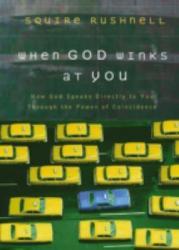
A few months ago, I received an e-mail from my mother that passed along a suggestion from my grandmother that I read this book. While not a long book by any means, my wife and I read a story each night after dinner and finished it in a few months. Basically, this collection of inspiring stories goes so far as to suggest that all the fortuitous coincidences we experience in our lives are evidence of a loving and all-powerful Creator. As a Christian, I did see most of these stories as supernaturally-influenced, even if my scientific mind was skeptical at times.
Separating the coincidental with the God-influenced can be difficult. While some stories seemed like mere coincidence, there were still quite a few contained in this volume that had no other explanation other than God showing off what He can do. Collected into a few different categories, many of these stories had us in tears as they were filled with touching moments that spoke to our ability as individuals to be God’s vessels to impart His timing in the lives of others, either to save their lives or to bring blessing into them.
In the end, the book does highlight how our lives can either be seen as a series of coincidences or as God-inspired plans. If we live our lives with the mindset that any lucky break or prescient reminder is just random chance, then we might miss out on some of the truly spectacular coincidences that have no other explanation than being orchestrated by a higher power. On the other hand, if we recognize even the smallest connections in our lives as God acting through the slightest details, we can be comforted in the fact that He cares about us, even down to the minutia.
A little book filled with inspirational stories, I give When God Winks 4.0 stars out of 5.
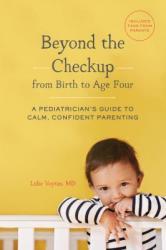
***THIS BOOK WAS RECEIVED FROM A GOODREADS GIVEAWAY***
While I do not have children yet, I am doing my best to prepare my knowledge for when they do become a part of my life. Consequently, books like Beyond the Checkup seem to be a perfect resource for parents, as it is written by a pediatrician. That being said, I think I'm probably a little biased in wanting an older, more grandfatherly pediatrician writing books like this. After all, a lifetime of experience seems to speak more than just 15-years-worth of it.
Regarding the book's content, Luk Voytas does a reasonably good job of presenting the big problems that might come up in a child's first four years. While he does use scientific studies to back up his suggestions, there are some instances where it's unclear whether or not there is any science behind his opinion, or if it's his own personal thoughts. I did appreciate the "case studies" in the back of the book, as I could see each of the ailments contained therein being something I'd want to reference in case it would happen with my child.
My only other qualms with this book have to do with the "asides" and the gender of the baby being referenced. Occasionally, Voytas will have a box with a little bit of extra information about a topic, but these boxes will often break the flow of a paragraph and seem to be more in the way than they should be. I also didn't particularly like how Voytas switched between male and female pronouns to describe the generic "baby" that the reader should have. I'd either say be consistently male or consistently female or at the very least use gender-neutral pronouns to describe the reader's baby.
An OK reference for parents with or expecting babies, I give Beyond the Checkup 3.0 stars out of 5.
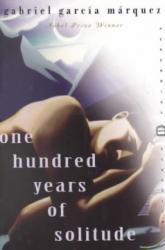
I’ll admit: I didn’t really “get” this book. I had seen a TED-Ed YouTube video that told me how great it was, and I decided to give it a try. While there were parts that were entertaining, most of this book went over my head. I suppose if I understood Columbian history and the culture of Central and South America, I might have had a better grasp of what was going on. As it was, I felt lost most of the time and kind of wonder what makes it so highly-recommended.
Perhaps my biggest qualm with this book is how its narrative structure is laid out. There’s practically no dialogue, and it’s basically told in the form of a parable or fairy tale. There are a lot of characters, but their names were so similar that I had trouble keeping track of them all. I get they’re all part of the same family, but having to remember so many individuals and the familial connections to each other was a struggle. I also felt a little lost because there wasn’t a strong narrative thread tying everything together other than the fact that it all took place in the same small town.
This is not to say One Hundred Years of Solitude has no merit, though. Some of the elements of “magical realism” were interesting and could have been the solid base of their own stories instead of being jammed together in this book. The pacing of this book was also pretty peppy, as it didn’t seem to linger too long with one character, realizing that it had many generations to cover. Even though it’s considered a classic (much like Ulysses ), I’m not sure if I agree, and I am certainly welcome to my opinion as you are welcome to yours.
A much better book for those who are “in the know,” I give One Hundred Years of Solitude 3.0 stars out of 5.
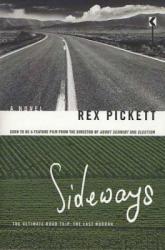
When I got into this book, the only things I knew about it were that it was about wine and it was made into a movie of the same name by Alexander Payne. Unfortunately, unlike a good wine, this book doesn’t seem to have aged well. Maybe people were able to put up with buddy comedy sex romps back in the early2000’s, but the social climate has changed considerably since then. I doubt a book like this would be written today, at least without some outcry from people who find the women in it to be inherently objectified.
Most of my issue with this book comes down to the characters. I’ll give the author credit for creating individuals that made me react to them so vehemently. The problem is that I hated these characters. I hated Jack for being so sex-crazed that he felt obligated to satiate his urges mere days before his wedding. Ihated Miles for being the stereotypical alcoholic failing author. If you wanted a template for poor life decisions, I think these two characters would fit the bill. There wasn’t much (if any) redemption in either of their story arcs, and both of them just seemed to enable their worse selves.
In the end, this book is supposed to be a comedy. At least, it’s a comedy in the sense that it ended with a wedding (as most comedic plays and musicals usually do). Sure, it’s filled with witty banter and some good stretches of natural dialogue, but there was hardly any vulnerability of the characters to give them any grounding. One moment near the end briefly pulled away to let Miles reminisce, but I would have liked some more consequences that would have forced both men to change for the better. And maybe that’s the point: real life doesn’t work that way, and I hate that there are real men out there who have these very same faults.
Terrible people in somewhat amusing situations, I give Sideways 2.5 stars out
of 5.
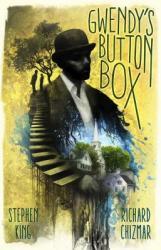
While most people think of Stephen King's book as being scary, this book was more suspenseful than scary. It is the story of Gwendy, a 12 year old girl who decided to run the suicide stairs in her neighborhood to lose weight before school starts. She meets a man wearing a black hat at the top of the stairs. This man calls her over by name and gives her a specialw box that will give her chocolate and silver dollars. The box has buttons on top and Gwendy can control what may happen by pushing one of the buttons. Once she takes the box, good things start happening in Gwendy's life. Gwendy becomes obsessed with the box and keeps it with her until after college, when she comes home one day to see a familiar black hat in her apartment. The story moves quickly and keeps you interested throughout the phases of Gwendy's life. If you are interested in Stephen King books but don't want to read anything too scary, this is a great book to start with.
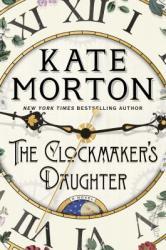
This story centers around an impassioned artist and his dreams, a mysterious murder, an enchanting English manor and all that went on their throughout its many years, a ghost that stands outside of time witness to it all, a vanished girl, an archivist and her discovery of a priceless artifacts, and how what went on there all those years ago effects who she is today.
In the past, the 1860’s to be exact, this story begins with a talented artist Edward Radcliffe and a group of artists that spend a summer at the house of his dreams Birchwood Manor. But shortly after arriving a mysterious murder is committed, a priceless artifact disappears and one of the women vanishes. A hundred years later in the present an archivist, named Elodie, finds a satchel which contains an unrelated photograph and a sketchbook that contains a drawing of Birchwood Manor. As she digs deeper into the mystery she is pulled into a story that has her questioning her past and who she truly is. This beautiful atmospheric mystery spans the length of time, and is told by the many voices and people all living within and around the Manor’s walls.
Before I go any further, first, let me say this. Kate Morton is the master of atmospheric beautiful Gothic mysteries and I am a big fan of hers and have loved every one of her past books. Her intricate and deeply rooted stories her beautiful prose, and her enchanting settings are the reasons why she is simply one of the best in her genre. That being said, this work, was a bit of a disappointment. While all the elements of what I love about Kate Morton’s books were there; an intricate story steeped in history, an old vast English manor with a secret or two to hide within its walls, old families with long pedigrees, a family mystery, an enchanting setting, this book fell short for me mainly because of its intricacy and complexity. I also believe the ending was a bit weak. I really wanted to love it, I just couldn’t.
Morton, I believe, really attempted to tell a challenging story, but simply had to many voices trying to tell it. While I like a good dual timeline novel, this one, with at least four voices and timelines was simply too much. There were times that, because of how she bounced around among the numerous timelines, when I got completely lost in which timeline I was following. This combined with how many characters and voices there were throughout the novel, made the story overall a whole lot less enjoyable. I’ll admit, this story took me a good while to get through and I do recommend, if reading this, keeping a list of who everyone is and which timeline goes where. It’s definitely a book you have to think through. That being said the story itself was beautiful and it makes me wonder, if it wouldn’t be better as an audio book where each of the voices are sounded out. Overall a 2.5-3 star read for me. However, if you are a Kate Morton fan and if you love atmospheric Gothic mysteries, I couldn’t count this one out, I would still give this one a go, just maybe as an audio book. Place your copy on hold today!
Thank you to Netgalley, Atria books, and Simon and Schuster for a DRC of this book in exchange for an honest review.
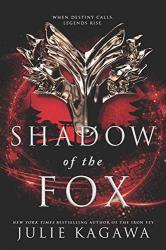
Every 10,000 years, an ancient dragon rises to give one mortal a wish (in exchange for their soul) and the world changes. Two characters, a kitsune-hybrid and a ninja, find themselves trying to keep the path to the dragon out of the hands of several interested and nefarious parties. Shadow of the Fox follows our heroes as they travel to and from different monasteries dodging monsters in their quest to protect ancient scrolls.
Shadow of the Fox was a ton of fun! It gave me Percy Jackson vibes, but was definitely for a slightly older audience and the mythology in this book was Japanese, which I found to be very cool. I liked both of the characters – the kitsune must hide her fox nature from her ninja travelling companion as he is a monster killer, and kitsune are a type of…if not monster, then non-human trickster. The ninja is trying to resist becoming possessed by the evil demon that occupies his sword. Their relationship is thus a bit fraught, but adds a really interesting dynamic. Their other travelling companion (a disgraced Samurai who spends most of the book amusingly drunk) provided some levity. Some of the mythology was completely new to me, which made for a engaging reading experience. I liked it enough that I read one of Kagawa’s other books, The Iron King, as well. If you enjoyed that one, you’ll likely like this – I found the formats to be similar, though I personally found the Japanese mythology more interesting than the fairies.
TLDR: This is a really entertaining and action packed fantasy for fans of Percy Jackson and Kagawa’s other books. I loved it, and am excited to get my own copy! 5 stars.
Thanks to Harlequin Teen and Netgalley for the eARC, which I received in exchange for an unbiased review. Shadow of the Fox is available now!
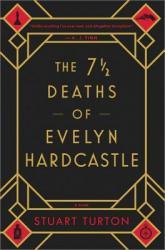
Finished this book at 2 a.m. (thanks a lot Mr. Turton!). Freaking amazing! I don't even quite know how to classify it - and I don't want to give anything away so I won't even try. Let's just say that it is like reading a REALLY good murder mystery through a kaleidoscope, shifting perspectives constantly to allow everything to eventually come together. I would suggest just letting the first half of the book just wash over you without trying too much to figure it out - otherwise it would get frustrating. And keep track of the characters - that is very important (and there are a lot of them!). Wow, just wow.

As I said in my review of Sourdough , I absolutely adored Robin Sloan's debut work, Mr. Penumbra's 24-hour Bookstore. Since Sourdough didn't necessarily sate my appetite, I found Ajax Penumbra 1969 to be a light snack that brought me back into the world created by Sloan. Acting as a bit of a short story/novella prequel to the first book, Ajax Penumbra 1969 still maintains the themes common in Sloan's work: mainly, the combination and juxtaposition of analog and digital technology. In this case, the reader just happens to come across this dichotomy in 1969.
Following the titular character from the first book, Ajax Penumbra 1969 gives the origins of this mysterious character as he searches for answers and eventually ends up in San Francisco at a little 24-hour bookstore. The following mystery and intrigue are what I would expect from such a story, but the inclusion of the budding technological aspects of the late 1960's helped to show that not only was this character finding his way to an eventual life filled with books, but technology's infancy already had much potential at this early stage of development.
It's a little difficult to say much about this short story/novella since it didn't even take a full two hours to listen to. At any rate, it's a fun little side story for those who had picked up Sloan's first work and fell in love with the ideas and characters presented therein. While not necessarily a book that most people would pick up and read without having already read Mr. Penumbra's 24-hour Bookstore, Ajax Penumbra 1969 is required reading for anyone like myself who has become enamored with Sloan's writing style over the last few years.
A fitting prequel to the events of Mr. Penumbra's 24-hour Bookstore, I give Ajax Penumbra 1969 4.0 stars out of 5.


